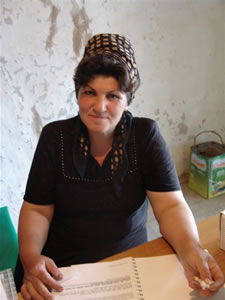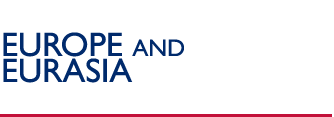Women Teach Neighbors to have Healthy Pregnancies, Safe Deliveries
Sadigat’s Story
“Why should I go to gynecologist during pregnancy? I am not the first woman to give birth,” says Najiba, a 23-year-old resident of the village of Bash Zeyzid in Azerbaijan’s Sheki region. Najiba is due to deliver in five weeks, but she has yet to see a gynecologist.
Despite some improvements in regional health infrastructure, a large number of Azeri women still do not receive a minimum level of health care during pregnancy. The reasons are diverse and include a general lack of awareness about possible complications both for mother and child.
According to government reports, Azerbaijan’s maternal mortality rate is 33 in 100,000 births. Although the rate is relatively low, the level of underreporting in Azerbaijan is high compared to other countries. However, lifetime risk of maternal death is 1 in 520 in Azerbaijan, alarmingly high when compared with the risk in European countries.
In many remote communities a majority of pregnant women like Najiba have never seen a health worker. Poor maternal nutrition and health, short birth intervals, and inaccessibility of emergency obstetrical services contribute to maternal and neonatal mortality and morbidity.
Najiba’s friend, Sadigat Rasulova, shares her mother’s story. Her mother did not practice family planning at all and, thus, had several unwanted pregnancies. The woman had eight deliveries but only four of her children survived. At that time, her family’s circumstances were desperate and it was difficult for her to receive adequate nutrition. During her last delivery, Sadigat’s mother bled heavily. By the time she was able to get to a hospital, she had died.
“My mother passed away because of her ignorance, illiteracy and lack of access to family planning methods. Even now, we witness such cases and we are not able to prevent them,” said Sadigat.
Sadigat asserts that pregnant women should be under strong supervision of doctors and gynecologists, and in case of an emergency they must be taken to a hospital in a timely manner. She doesn’t understand her friend’s nonchalant attitude toward her pregnancy and health.
“Like many other women in remote places, Najiba has very little knowledge of reproductive health and therefore can’t understand the importance of health care during pregnancy,” said Sadigat.
A modest housewife, Sadigat recently became a leader in her community as a member of the Community Action Group (CAG), through which she educates women in her village on reproductive health and family planning.
“My mother lived in a community where access to accurate information to women’s health issues was denied. That’s why she died. I can’t get her back but I can help women like Najiba improve their health and give a birth to healthy babies,” said Sadigat.
Understanding the importance of saving lives, Sadigat stresses the need to go to a health facility in case complications arise either during pregnancy or at the time of delivery. She also works to reduce abortion rates in her community by promoting family planning methods.
Sadigat’s input to community development is an important part of Primary Health Care Strengthening (PHCS) program, a broad reform-oriented initiative funded by USAID. The PHCS program is implemented by a consortium of leading public health agencies led by International Medical Corps, which include the Johns Hopkins University Center for Communication Programs, Abt Associates, and Curatio International Foundation.
“For years I avoided asking myself why my mother died and just lived my life. Honestly, I was about to replicate my mother’s story. I did not practice family planning methods and this started to damage my health. Through the PHCS program, I’ve changed my attitude, behavior, and life. I am now healthy and strong. And eager to motivate others for a social change,” said Sadigat. She believes her friend Najiba will give birth to a healthy child and will ensure he or she has proper care. “Because I’ll be there with help and advice,” Sadigat said.
Tarana’s Story
Tarana Akparova, 22, a pregnant woman from Kurderdarbeyly, a village in Ismayilli, has a different story to tell. An encounter with the PHCS program convinced Tarana that she needed to go to a health post or hospital in case of complications during her pregnancy.
‘When I returned home from a community-based training session on reproductive health and family planning, I started a campaign among my neighbors, trying to persuade them of the importance of health care during pregnancy,” Tarana recalled. In her community, women rely primarily on traditional birth attendants or family members for pregnancy-related matters.
On the following day, Tarana went to a local clinic where she was told she had a virus that was dangerous to her pregnancy. The doctor was very kind and attentive; she advised Tarana not to panic and helped her obtain the necessary treatment.
In most of the rural areas, pregnant women often carry heavy loads and have to work hard in the field. “When I do not work, I get bored,” declared Tarana. “But now that I am aware of possible complications caused by physical stress, I try to avoid hard work.”
Thanks to the PHSC project, Tarana is much informed and relaxed during her pregnancy—and she never forgets to visit her doctor.
Shahla’s Story
According to Dr. Shahla Babayeva, a community health worker with the PHCS program, timely and accurate information on reproductive health is undeniably needed in the remote communities where women are uninformed about their own bodies. “It’s hard to believe that there are women who have more than ten grandchildren but do not have a single idea about reproductive organs,” noted Dr. Babayeva.
In Ismayilli, a picturesque region high in the mountains, a majority of women are housewives. Due to the widely practiced tradition of early marriage, and the fact that most married girls are illiterate, there is very little awareness about contraceptive methods. Dr. Babayeva says women do not practice family planning at all.
An altruist by nature, the doctor admits that her favorite part of her job is serving people. She has spent more than six years with USAID implementing partner IMC in Azerbaijan, improving women’s health care. “Women are critical to the health and well being of children, families, communities, and nations, so it is very important to integrate activities that address the needs of women,” emphasized Dr. Babayeva.
As part of the USAID-funded PHCS program, 350 community volunteers have been trained on reproductive health and family planning. They are now working in their communities to share their knowledge and promote good health. Dr. Babayeva anticipates that 1,300 women in the remote communities of Ismayilli, Sheki and Gakh will improve their own health, as well as their families’ well-being, though this initiative.
Studies have shown that the lives of many women can be saved by offering them basic information regarding pre- and post-natal care. USAID and its partners are committed to saving the lives of mothers and newborns by increasing the timely use of key maternal and neonatal health and nutrition practices. Dr. Babayeva is optimistic about the impact of her work. Many of the women who have received health education–even those who are illiterate–seek counseling during pregnancy and after giving birth.
“Our program succeeds in improving women’s health care through timely and comprehensive health education. Women bear responsibility for the health and well being of the whole family. I am confident that each woman in the community who received training will not only lead healthy lifestyles but will also pass her knowledge to others to promote health in the community,” said Dr. Babayeva.
 |
 |
| An Azeri woman and her daughter attend a USAID PHCS Project health education session in a remote community of the Ismayilli district |
Sadagat credits her transformation from a modest Azeri housewife to a local community leader to the PHCS Project |
Back to Top ^ |


